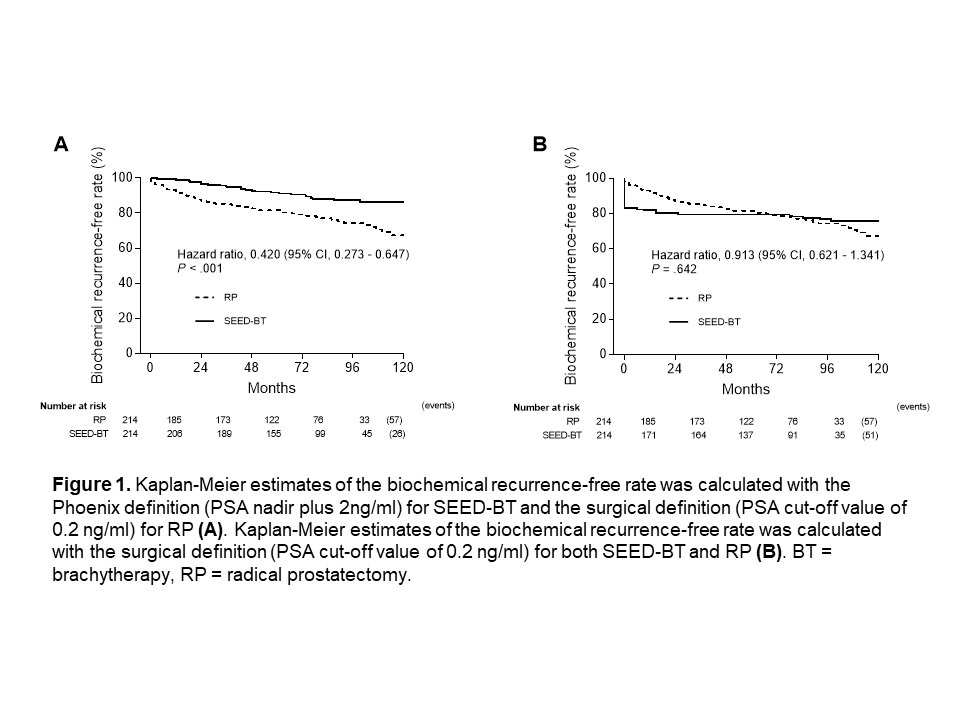Back
Poster, Podium & Video Sessions
Podium
PD22: Prostate Cancer: Localized: Radiation Therapy
PD22-05: Comparison of Low-Dose-Rate Brachytherapy Versus Radical Prostatectomy in Patients with Intermediate-Risk Prostate Cancer: A Propensity-Matched Multi-Institutional Study
Saturday, May 14, 2022
10:10 AM – 10:20 AM
Location: Room 252
Hideyasu Tsumura*, Sagamihara, Japan, Nobumichi Tanaka, Kashihara, Japan, Tomohiko Oguchi, Nagano, Japan, Takuya Owari, Yasushi Nakai, Isao Asakawa, Kashihara, Japan, Kazuyoshi Iijima, Haruaki Kato, Iwao Hashida, Nagano, Japan, Ken-ichi Tabata, Takefumi Satoh, Hiromichi Ishiyama, Sagamihara, Japan
- HT
Hideyasu Tsumura
Kitasato University School of Medicine
Podium Presenter(s)
Introduction: We compared oncological outcomes between seed brachytherapy (SEED-BT) and radical prostatectomy (RP) for intermediate-risk prostate cancer patients.
Methods: From 2006 to 2011, 1267 patients diagnosed with intermediate-risk prostate cancer were treated with either SEED-BT (n=933) or RP (n=334) at 3 tertiary hospitals. RP was performed either open retropubic approach or laparoscopic surgery. One-to-one propensity score matching was performed to evaluate the clinical outcomes between the two treatments. We compared the biochemical recurrence (BCR)-free rate between the two treatment modalities using the Phoenix definition (PSA nadir plus 2ng/ml) for SEED-BT and the surgical definition (PSA cut-off value of 0.2 ng/ml) for RP. We also compared the BCR-free rate between the two treatments using the same definition for which the surgical definition was used in both SEED-BT and RP. When the PSA value did not reach <0.2ng/ml, the patient was defined as BCR at one day after each procedure in the surgical definition.
Results: In the propensity score-matched analysis with 214 pairs, the median follow-up treatment was at 96 months (range 1-158). Fifty-three (24.7%) patients were treated with the combination of SEED-BT and external beam radiotherapy (EBRT). When we compared the BCR-rate using the Phoenix definition for SEED-BT and the surgical definition for RP, SEED-BT yielded a significantly better 8-year BCR-free rate than RP (87.4% vs 74.3%, HR 0.420, 95% CI 0.273-0.647) (Figure 1A). When we compared the 8-year BCR-rate using the surgical definition for both treatments, there was no significant difference between the two treatment modalities (76.7% vs 74.3%, HR 0.913, 95% CI 0.621-1.341) (Figure 1B). SEED-BT yielded a significantly better 8-year salvage hormonal therapy-free survival than RP (92.0% vs 85.6%, HR 0.528, 95% CI 0.296 - 0.942). There was no significant difference in the 8-year overall survival rate between the treatments (91.9% vs 94.6%, HR 1.353, 95% CI 0.690 -2.650, P = 0.378).
Conclusions: Treatment with SEED-BT plus or minus the combination of EBRT or RP is a reasonable option for intermediate-risk prostate cancer patients. We could compare favorably SEED-BT with RP in oncological outcomes.
Source of Funding: None

Methods: From 2006 to 2011, 1267 patients diagnosed with intermediate-risk prostate cancer were treated with either SEED-BT (n=933) or RP (n=334) at 3 tertiary hospitals. RP was performed either open retropubic approach or laparoscopic surgery. One-to-one propensity score matching was performed to evaluate the clinical outcomes between the two treatments. We compared the biochemical recurrence (BCR)-free rate between the two treatment modalities using the Phoenix definition (PSA nadir plus 2ng/ml) for SEED-BT and the surgical definition (PSA cut-off value of 0.2 ng/ml) for RP. We also compared the BCR-free rate between the two treatments using the same definition for which the surgical definition was used in both SEED-BT and RP. When the PSA value did not reach <0.2ng/ml, the patient was defined as BCR at one day after each procedure in the surgical definition.
Results: In the propensity score-matched analysis with 214 pairs, the median follow-up treatment was at 96 months (range 1-158). Fifty-three (24.7%) patients were treated with the combination of SEED-BT and external beam radiotherapy (EBRT). When we compared the BCR-rate using the Phoenix definition for SEED-BT and the surgical definition for RP, SEED-BT yielded a significantly better 8-year BCR-free rate than RP (87.4% vs 74.3%, HR 0.420, 95% CI 0.273-0.647) (Figure 1A). When we compared the 8-year BCR-rate using the surgical definition for both treatments, there was no significant difference between the two treatment modalities (76.7% vs 74.3%, HR 0.913, 95% CI 0.621-1.341) (Figure 1B). SEED-BT yielded a significantly better 8-year salvage hormonal therapy-free survival than RP (92.0% vs 85.6%, HR 0.528, 95% CI 0.296 - 0.942). There was no significant difference in the 8-year overall survival rate between the treatments (91.9% vs 94.6%, HR 1.353, 95% CI 0.690 -2.650, P = 0.378).
Conclusions: Treatment with SEED-BT plus or minus the combination of EBRT or RP is a reasonable option for intermediate-risk prostate cancer patients. We could compare favorably SEED-BT with RP in oncological outcomes.
Source of Funding: None


.jpg)
.jpg)